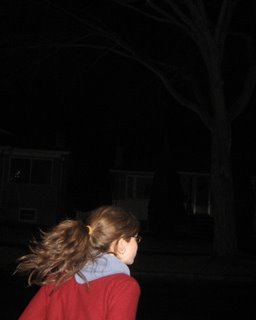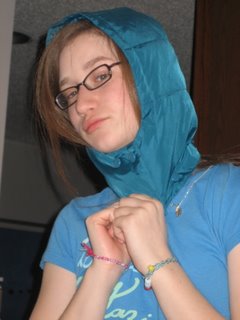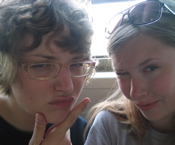
Freedom at last! My exams are now officially finito, the Oilers are totally leading their playoff series with the Red Wings, it’s forecasted to be a glorious week of sunny excellence, and I’m enormously elated. Not that school isn’t something to be enjoyed, but I’ve found my courses this term to be surprisingly dry this term, and without the constraints of homework, studying, and required early evenings, I can now indulge in all the concerts, reading, festivals, swinging, journaling, biking, Sudoko puzzling, picnicking, lounging, tennis playing, etcetera that my heart desires. I so love this time of year when the juxtaposition of soporific studying and complete and utter languor is at its most acute. There’s nothing quite like guilt-free lethargy or an excess of summer silliness to make all concerns over GPA and inane details about psychology experimentation or eigenvectors fade away. I do believe that too many students live for the summer, just as too many of them live for the weekend; there are zillions of things to enjoy about the absurdity of other students, cuteness/quirkiness of profs, strangeness of course content, beauty of campus, and peculiarity of the bureaucracy at my beloved U of A. However, summer never fails to make these aforementioned aspects of academia look somewhat lame in comparison. One of my favourite days of all days in the calendar of the school year is the day of that last exam (or in my unfortunate case, exams), when upon handing in the exam, I exhale, turn on my iPod, and walk home while reminiscing about the year, thanking God for all the cool stuff He blessed me with, and planning ways in which to celebrate my newfound lack of anxiety. Yesterday was a particularly fabulous last day, as it was capped off with a lovely shower, outfit planning with Jess, and six and a half hours of bliss at the Shaw.
So after my most dapper sister and I had completed the process of negotiating which tops and bags would look the least ridiculous together, we caught our darling Number 9 bus to get a decent spot in the queue, which meant we were on the very top step of the Shaw’s seemingly endless staircase, leading us to believe we’d get a reasonable spot a third of the way back in the Shaw. In spite of this, Jess and I managed to get an astonishing spot smack dab in the centre in the fourth “row” of people; we never even get such fabulous vantage points at the Starlite, so I’m not actually sure how we managed to get such a perfect spot among the 4,500 sold out crowd. Needless to say, there was much high-fiving and exclamation of how close we’d be to Alex and Ben. Although I’ve got a Cribs album, I clearly don’t listen to it nearly enough, since I was rather impressed with their high-energy set which was very conducive to dancing and admiration by Jay Jay and I of their ever-so-tight jeans. Their British accents, striped t-shirts, and great sound made them a thoroughly enjoyable warm up act. Now, there are times at concerts when human nature is so blatantly evident, and the time between The Cribs’ and Death Cab’s performances was certainly one of them. The front 200 people were smushed together in one of those swaying insect-like formations, which resulted in my hair being pulled in an extremely painful fashion, and much groping by my neighbours. I realize that many people do find this enjoyable, but I sincerely find very little fun in pain and a lack of decency, and it’s in instances like these that I’m so aware of how twisted we as humans are; I fail to understand the seeming masochism inherent in circle pits, and the selfishness of squeezing up against your fellow concert-goers when the vast majority of concert goers have little desire to struggle to breath and remain at a comfortable temperature. At least Jess was there being pushed around with me to have a philosophical discourse over thee reality of humanity and its flaws; this made the pain and discomfort bearable.
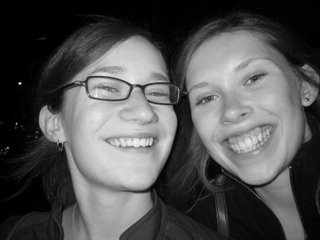
As soon as Death Cab made its way onto the stage though, all was right with the world. The group of us in the front was afforded some space as the crowd moved back a smidge, and Ben opened with “Passenger Seat,” a song so intimate and stunning that it made the reality of summer’s arrival and the beauty of times with friends like Jess so vivid. I love the transcendental nature of Ben’s lyrics and melodies, and in concert the ability of his voice to transport the listener to the serenity of the scenes he paints in his songs is even more potent. Ben’s words are so inherently true and pensive that in a song like “Crooked Teeth,” repetition of the line “you can't find nothing at all if there was nothing there all along” is so striking and genuine that each time the crowd sang it with him, it carried such significance and certainty. Whether it relates to the superficiality of our culture, the mediocrity of institutions, souring of relationships, or a lack of substance in what we fill our lives with, Death Cab songs always have the power to be so incredibly relatable, regardless of the individual, situation, or scope. As everyone in the 4,500-strong audience sang “Different Names for the Same Thing” along with Ben, I was hit by the cohesiveness of the group, despite the varying degrees of inebriation, education, age, and relationship with God. My previous thoughts about human nature returned, and I considered how we were all flawed and united in our need for God’s grace. After all, cheerleader, emo kid, punk, prepster, and hipster are all different names for the same thing: we’re all children of God, we’re all sinful, and we’re all made in His image. Plus, we can all take pleasure in the beauty of the music that He gave us an appreciation for. The song is essentially a thesis on the blanket theory, the idea that everything is connected, which fits nicely with the idea (and truth, of course) that everything has been created by God, and that there is certainly loveliness in the reality that competing against each other in this rat race of life is futile, and that there’s a greater truth that unifies us.
Although Death Cab somehow neglected to sing my favourite song of all, “Transatlanticism,” he fit in the gorgeous “I Will Follow You Into the Dark,” which Jess and I sang along to with arms linked and at times eyes closed. The imagery in the song is so powerful and moving, while the sentiments of the lyrics are both poignant and morbid. Ben implies in the song that love outlasts the constraints of death, which is a rather spiritual idea, and the sincerity of the speaker’s love in the lyrics is quite beautiful; it echoes clichéd avowals of love that one’s love is so strong that they would die for their beloved, or that soul mates will be together forever. In typical DCFC style, the song is romantic in its notions about love, but candid in the veracity of our mortality, need for others, imperfections, and inability to communicate at times. Another one of my favourites that the set didn’t fail to miss was “Title and Registration,” with lyrics that reflect on the bitterness caused by disappointment, and how that acrimony can taint our perception of everything and everyone else. The acidity over the simple fact that “glove compartment” is an inaccurate name and that there’s no comfort for bitterly cold hands behind the door illustrate the lack of warmth in alienated loneliness and sorrowful compunction. It’s a reminder to me not to let frustration over one thing taint anything else, as it often can, and the band’s performance of the song managed to evoke the sullenness of the lyrics to a tee. The final song worth mentioning was “What Sarah Said,” another one focused on death and love, but one that has a sense of hope despite its morose content. Superficially, the lyrics are about the difficulty of watching a loved one pass away and the inevitability of our death. More generally, the words speak about facing each other’s mortality, and in a Christian sense, facing the fact that we’re mortal because of our sin. It’s awfully difficult at times to watch grandparents age, and see the effects of that aging process; it’s also difficult at times to love people with all of their mortal faults, but we’re called to do so, and knowing my own shortcomings and God’s love for us all makes this easier.

Especially considering the lukewarm reviews that Death Cab tends to garner (most reviewers often refer to the fact that Death Cab concerts are all generally the same, and that the performance of the songs deviates very little from the recored tracks), Jess and I had a spectacular time cozied up beside each other, singing along to the insightful-as-ever songs, and hanging out with fellow music enthusiasts all while being within arms length of one of my favourite bands. Death Cab’s earnest love for music and Ben’s belief in what he sings were so remarkable, and they’re clearly a band that performs for the music’s sake, rather than the glory of entertaining a crowd or earning a living. Chris Walla (as I’ve told most of you, a fellow barista of mine!) and I even had a moment where he acknowledged my creepily ginormous smile and smiled back for more than two seconds; needless to say, it was one of the greatest concert moments ever. I’ve loads more to drone on about, but I should likely get outdoors and enjoy the splendid sunshine, so I’ll describe Franz’s act only briefly, despite it meriting a lengthy discussion of its magnificence. By the end of their hour-long set, my palms were swollen from clapping, my feet bruised from being trodden on in all of the frenetic moshing, my voice sore from singing aloud so vociferously, my face aching from smiling constantly, and my heart unbelievably contented from the excellence of my favourite Scottish band. In true form, the band was decked out in fabulously pretty clothes and Alex was both eloquent and irreverent, even sincerely (I really do believe it was sincere; not simple facetiousness) thanking the crowd during the encore that included a school-being-done appropriate “Better on Holiday” and a sextet drumming “solo” with members of DCFC and The Cribs that was immensely dancerrific. Bob even graciously sported a cowboy hat at one point from the audience, thus convincing me that British people can sport North American fashion far better than we ourselves can. Because I really would like to go on for ages about the concert and each of the songs’ individual greatness, I’m posting my most romantic of my Death Cab essays. It focuses on love songs, which have been smeared by some of my friends recently, so hopefully it will redeem the love song at least slightly. Don’t read the entire thing though, because it’s a discussion of love poetry and is incoherent near the end, though somehow my lovely English prof seemed to miss that fact; just recognize that the age-old tradition of lyrical expressions is alive and well thanks to bands like Death Cab, and even the often unromantic Franz Ferdinand. Anyways, I’m off to frolick about in my newly reclaimed summer skin!
P.S. Don’t actually read through the essay! Seriously, I only posted it to demonstrate that I’m not entirely imagining the depth and truth inherent in Ben’s lyrics, not so that you could read through the jumble of words that constitute my English nonsense. Apparently poor Andrew tried to go through it, and somehow survived, but I’m sure that he’s still in critical condition after all of the protracted sentences and references to obscure poetry. Cait’s English essays are really not for the faint of heart, or even the slightly faint of heart; only the breed of humans that we refer to as English profs should ever be subjected to these ramblings. If anyone endeavours to read the entire thing, my telepathy will allow me to be alerted of such ventures, and I’ll remove the post. Either that, or I’ll come visit you and listen to Death Cab songs while reading love poetry, predictably leading to my tearing up, and your certain discomfort.
Conventions Live On in Death Cab for Cutie

The expression of love through poetry has taken place for millennia, and through those years standards and expectations for this written articulation have evolved. Such conventions have not only been carried through generations of poets, but have been renegotiated through time with the development of society and literary innovations. Just as ballads were once the musical form of love poetry, the albums mass-produced today serve a similar function in communicating the complexities of love with music. While popular music is often plagued by cliché and formulaic arrangements, the independent music scene has upheld a reputation for being subversive and distinctive. However, even the unusual artists of the independent genre are unoriginal in employing the conventions of love poetry in their lyrics. Despite frequently being cited as one of the “poster bands” of independent rock and roll, the band Death Cab for Cutie is an excellent illustration of the inexorable nature of convention in love-related writing. This Seattle based band’s 2003 album “Transatlanticism” presents songs that depict love in superficially uncommon manners, yet the fundamental values and expectations of love poetry appear in each of the eleven tracks on the recording. Indeed, the three songs that focus most closely on issues of love, “Transatlanticism,” “Lightness,” and “A Lack of Colour” adhere most closely to these conventions of love poetry.
Perhaps the most hauntingly beautiful of Death Cab for Cutie’s lyrics are found in their title track, “Transatlanticism,” which follows the end of a relationship between the voice of the piece and his lover, as he shares her with the “perforated sphere” (Death Cab for Cutie, 3), the earth, and in that process loses her. His remorse over “making islands where no islands should go” (Death Cab for Cutie, 6) results in the speaker’s reflection on the evolving distance between his beloved and himself, a theme that in itself is reminiscent of preceding love poetry. Indeed, the growing distance between the “bright-eyed” (Catullus 2.5) speaker and Lesbia illustrated by Catullus’ sequence of poetry strongly parallels the motif of “Transatlanticism.” An initially romantic depiction of two lovers when “the sun shone brilliantly,” (Catullus, 8.3) develops into a tempestuous, then non-existent relationship as Catullus laments, “she’s stopped wanting, you must stop, weakling,” (Catullus, 8.9). However, this portrayal of two lovers drifting apart is certainly not unique to these aforementioned pieces, as evidenced by Carol Ann Duffy’s poem “Mrs Midas.” This selection is found in her collection of pieces entitled “”The World’s Wife,” a title appropriate because it examines women whose lovers are renowned or who themselves are well recognized, and also because their experiences are universal. While “Mr Midas” has chosen to engage in the pursuit of wealth in the figurative form of gold, Mrs Midas describes her horror at his strangeness to, and estrangement from, her when she starts “to scream,” (Duffy, “Mrs Midas” 25). This distance eventually increases to a point at which “he had to move out,” while she continues to think about him “in certain lights, dawn, late afternoon,” (Duffy, “Mrs Midas” 49 and 74). Mrs Midas’ residual desire for the absent lover mirrors that of the voice in “Transatlanticism” as he states “i need you so much closer,” despite having acknowledged that the distance separating him from his beloved is “simply much too far for me to row,” (Death Cab for Cutie, “Transatlanticism” 11 and 14).

Also significant in his conviction that he “needs” her is the implied sentiment that he must have her in order to survive despite the impossibility of having the beloved. This too is suggested in Lady Mary Wroth’s “Sonnet 13” as the speaker suggests that the lover’s attention is “all the food” that she desires” (9). This tag line pleading futilely with her to “come on, come on,” (Death Cab for Cutie, “Transatlanticism” 13) so he can satisfy his needs is also reminiscent of Astrophel’s assertion in “Astrophel and Stella XX” by Sir Phillip Sidney (Wroth’s influential uncle) that the pangs of love for a parted Stella are his “death wound” (1). He expresses that he cannot live without his lover and is desperate for love, yet is unable to access it, a recurrent premise in love poetry throughout its history. The speaker’s description of the “thousands upon thousands” (Death Cab for Cutie, 5) suggests his bitterness over having shared her with others, found in other love poetry, such as Catullus 5. Not only does Catullus enumerate their kisses as “a thousand, then a hundred” in the conventionally hyperbolic fashion of this poetry, but he also indicates his desire to possess her and keep her from all others, “some villain” (Catullus 5.7 and 5.12). A male lover’s vain attempt to control his beloved is a strong image in much of Sir Thomas Wyatt’s poetry, as he depicts his beloved as a hawk “with naked foot” that may at first “take bread” at his hand, but eventually loses her tamed tendencies and moves on to “newfangleness” (“They flee from me that Sometime did me Seek” 2, 6, and 19). Finally, it is the image of suffering and sorrow that characterize “Transatlanticism” as conventional. From the moment when “the clouds above opened up and let it out” thus creating the “atlantic,” the imagery of water is sustained, signifying profuse tears, similar to Lady Mary Wroth’s Pamphilia weeping “all night” and crying “all day” (Pamphilia to Amphilanthus, Song 2.1). These metaphors for the grief or “martyrdom” (Petrarch, Sonnet 164.12) of the speakers serve a dual role by additionally proving true and making his or her love unique, as it was fated and cannot be overcome by human forces. Again, this portrays the exaggeration present in much of love poetry, including the superficially (at least from the musical arrangement and tone) understated song “Transatlanticism.”

As the clearest song of convention on Death Cab for Cutie’s Album, “Lightness” explores the lustful side of love, and in doing so utilizes convention to suggest the beauty and emotions caused by the beloved in the song. The lust experienced by the speaker is concentrated on the dress worn by his lover, and the “ivory lines” (Death Cab for Cutie, “Lightness” 5), or bra straps, which show through the slit in her dress. The equation of paleness with beauty has been present in Western culture for much of its history, with the image of “fair” (Sir Thomas Wyatt, “Avising the Bright Beams 1) features as being just as beautiful and perfect as the “fairest book of nature,” also suggesting that what is in a woman is similarly the “most fair” (Sir Phillip Sidney, “Astrophel and Stella 271.1 and 271.11). In Christina Rosetta’s “Sonnet 8” from Monna Insominatia: A Sonnet of Sonnets even the biblical figure Esther’s “fair” (2) appearance is associated with her powers of persuasion through beauty over King Ahasuerus, suggesting the power of this image to represent beauty. Conversely, the white portrait in “Lightness” also operates as an indication of the speaker’s melancholy, since he cannot uncover what lies beneath those “ivory lines” (5), much like the “sad moon” (1) of Sidney’s “Astrophel and Stella 31” is given its sorrowful personification by its depiction as being “wan” (2). Likely the most clear connection of “Lightness” to its predecessors is to “They flee from me that Sometime did me Seek” authored by Sir Thomas Wyatt with his corresponding portrayal of the speaker’s “loose gown from her shoulders did fall” (11) just as the dress of the beloved in “Lightness” seems to be on the verge of falling off. Even the plot and imagery employed by the authors of “Lightness” strongly echo those of Wyatt in his erotically charged piece as he describes the, albeit bird-like, sexual features and appearance of his lovers. Wyatt’s speaker recalls “naked foot” in his “chamber” (Sir Thomas Wyatt, “They flee from me that Sometime did me seek” 2), clearly implying the nude act that would take place in his chamber. However, this sexual act is never literally stated in this poem, but is rather euphemistically described by phrases like “take bread at my hand” and “I so kindly am served” (“They flee from me that Sometime did me seek” 6 and 20), analogous to the nonexistence of sexually explicit description in “Lightness” despite being a song written in the uninhibited twenty first century. Instead, the lust of the speaker is displaced by the sound “oo wha-ho, oo wha-ho” (6), thus maintaining the sense of mystery, intimacy, and the overall decorum that would be palatable to listeners. Vague allusions such as these are absolutely conventional in love poetry, since, until recently, it would have been generally unacceptable to portray sex in such frank terms. Therefore it is obliquely suggested with diction such as “loose the girdle” (Catullus 2B.3), “turning others’ leaves” (Sir Phillip Sidney, Astrophel and Stella 1.7), and “some food” (Sir Phillip Sidney, Astrophel and Stella 71.14).

Perhaps an unintended interpretation of “Lightness” is derived from its chorus that claims that “instincts are misleading” (13), which is a theme not only of love poetry, but of real love. Many sequences of love poetry follow the progression of an initially wonderful romance into the despair of either one or both of the lovers, as is represented the speaker of Petrarch’s “Sonnet 190” who discovers that his Laura, distinguished originally by “such pride and sweetness” (5), is “gone” (14) from him and he cannot be “sated” (13). Strephon’s intense disappointment at the realities of his beloved Chloe as chronicled in “Strephon and Chloe” by Jonathan Swift follows a similar pattern, as the voice’s original description of Chloe as “so beautiful a nymph” (3) evolves to a point at which “Opinion falls, and Beauty dies” (226). In a less abrupt fashion, the speaker of Charles Bukowski’s “huge ear rings“ who at first believes that each time he sees his lover “she looks better and better” (27-28) eventually comes to the conclusion in “a killer” that:
consistency is terrific:
shark-mouth
grubby interior …. (1-3)
and despite initial adoration for her, Scarlet “walks down the street” (20) away from the speaker. Thus, the contention of the voice of “Lightness” appears to be bound for certain disenchantment upon the experience of the “oo wha-ho” (6) that he so pleadingly requests. Yet the chief contention of “Lightness” is found in the chorus of the song as the dichotomy of the heart and mind is examined:
oh, instincts are misleading
you shouldn’t think what you’re feeling
they don’t tell you what you know you should want. (13-15)
Though the word “instincts” is utilized to represent the caution she experiences in opposition to her feelings, it connotates a concern for consequences that may be experienced in the future, just as the mind might, while “feelings” signify the figurative heart (Death Cab for Cutie, “Lightness” 13 and 14). As the speaker attempts to lure his beloved into giving in to his desires, he makes use of a convention that has been utilized a great deal of love poetry: the concept that one should follow her heart and not her head. The voice of the song stresses that his lover’s heart is “a river” flowing from her chest, while her “brain is the dam,” holding her back (Death Cab for Cutie, “Lightness” 7 and 9). To be sure, it is not the logic of Christopher Marlowe’s speaker in “The Passionate Shepherd to his Love” that is depicted in the poem, but rather his idealistic emotions, as he envisions “a thousand fragrant posies” (10) and “coral clasps and amber studs” (18), objects which would \ not be available to a shepherd and would certainly be useless in sustaining love between a man and a woman. Despite this fact, the voices of both “Lightness” and “The Passionate Shepherd to his Love” expect their rationales to be accepted by their beloveds, since “these delights” (Christopher Marlowe, “The Passionate Shepherd to his Love” 23) should move these women’s minds.
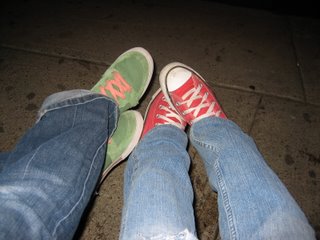
Set at a different point in a relationship, the song “A Lack of Colour” by Death Cab for Cutie represents the speaker’s reassuring words to his beloved, and his perception of her beauty and their love. Despite being only six lines in length, this poetic song suggests a great deal about the complexities of romantic relationships, and utilizes conventions of poetry to translate these intricacies into words. The most notable convention in “A Lack of Colour” is its use of pseudo-paradoxical statements, whether it be “when I see you, I really see you upside down” (1) or the final lines:
…. when there’s a lack of colour here
…. it's really bursting at the seams
…. from absorbing everything the spectrum’s A to Z. (4-6)
One of the greatest examples of this use of oxymoronic language is Petrarch, who uses contradictory ideas to exemplify the instability, illogical nature, and conflicting emotions brought on by love. These contradictions include “fear and hope,” “I have no tongue, and shout; eyeless I see,” and “weeping I laugh” (Petrarch 134.2, 134.9, and 134.12). This commonality in love poetry was introduced to English literature after Sir Thomas Wyatt popularized it in poems like “Avising the Bright Beams,” in which his speaker complains of “frozen thought, now and now it standeth in flame” and juxtaposes “misery and wealth,” “earnest and game,” and “such a root cometh fruitless” (10, 11, and 14). Not only are there statements of paradox, but there are also abstract concepts of opposition, such as the conflict between the heart and the brain as his “brain knows better,” the inside and outside, and the idea of appearance versus reality with a seeming “lack of colour” but actuality of colour “bursting at the seams” (Death Cab for Cutie, “A Lack of Colour” 2, 4, and 5). Concepts of appearance versus reality are a true convention, as the relationship between “fact” and “fiction” (Death Cab for Cutie, “A Lack of Colour” 13) are present in love poetry dating back to Catullus, who in Catullus 70 feels remorse over the fact that Lesbia, as he asserts all women have, deceived him:
My woman says there’s no one she would rather wed
Than me, not even if asked by Jove himself.
Says—but what a woman says to an eager lover
One should write on the wind and the running water. (1-4)
Each of these uses of the relationship between what seems to be and what is emphasize the bitterness of the speakers in losing their beloveds, as the male in “A Lack of Colour” experiences the inability of the superficial beauty represented in “every girlie magazine” (15) to make him feel “any less alone” (16).

The analytical approach to love depicted in “A Lack of Colour” with even the actual mode of perception of viewing his beloved being scrutinized as the speaker recognizes that he really sees her “upside down” (1) by the inner workings of his visual system, and it is his brain that has reversed the icon. Just as the voice of the song “turns” his lover’s image “around” (Death Cab for Cutie, “A Lack of Colour” 3) in his head, and attempts to vocalize his emotions, Christina Rossetti’s nameless woman almost incessantly contemplates her love for her beloved, as she thinks of him, “and all that was,” (Monna Innominata: A Sonnet of Sonnets, Sonnet 9.1). Unlike Strephon of Jonathan Swift’s “The Lady’s Dressing Room” whose deep examination into the depths of his beloved Celia results in his repulsion with Celia over his discovery that “‘Celia, Celia, Celia shits!’” (118), the speaker of “A Lack of Colour” is overwhelmed with his lover’s multifaceted beauty. Instead, it is Charles Bukowski whose writing mirrors this pleasantly satisfied investigation into the beloved. Bukowski’s speaker in “imagination and reality” opens cupboards, “looking in” (11) and appears to be pleased by what he observes. The key motif of “A Lack of Colour,” is the means of perceiving this colour, through the instrument that is depicted the most in love poetry, the eyes. Sir Thomas Wyatt’s piece “Avising the Bright Beams” dwells almost entirely on this imagery, as Wyatt’s speaker even describes “the bright beams of these fair eyes,” (1) as the poet may have believed in a former idea of active viewing, rather than the passive viewing of waves of light that science indicates today. Indeed, it would seem that the eyes are attributed power in this passage, not only to behold such transcendent beauty, but also to be the source of beauty that cause the speaker’s eyes to be “oft moiseth and washeth” (“Avising the Bright Beams” 2). It is the juxtaposition of these sun-like “beams” (“Avising the Bright Beams” 2) of light emitted from the beloved’s eyes and the tears of the male lover that emphasize her unworldly beauty and celestial status. Likely the most subtle, or possibly obvious, convention made use of in “A Lack of Colour” is the second person narration, and more specifically the conversational tone of the song, as it begins with a continuation of an antecedent thought: “and when I see you….” (1). Audiences tend to expect this intimate, voyeuristic examination of the love between two individuals, since it has been a convention adhered to by many poets for centuries, whether in a persuasive speech by the voice of Christopher Marlowe’s “The Passionate Shepherd to his Love” pleading with his lover to “come live with me and be my love” (1), or the reflective, post-departure words of Pamphilia stating “when last I saw thee, I did not thee see” (Lady Mary Wroth, Pamphilia to Amphilantus, Sonnet 21.1). This intimate portrayal of the two lovers at some point in their relationship, however, often serves to foil the separation between them, emphasizing the frustration with that lacking intimacy.
Although Death Cab for Cutie appears to be bounded by many of the expectations of love poetry in their songwriting, one cannot reproach them for the use of these conventions. This acceptance of standards followed by past poets is due in part to the fact that love is experienced almost universally, and the emotions and actions that are the result of love share many commonalities. Thus, convention must be employed in order to fully expose the reality of love and represent it in an accurate fashion. Some expectations of love writing have faded over time, such as the use of strict rhyme and meter schemes in poetry and the imposing, unquestionable role of the male lover in a relationship. However, the fundamentals of portraying the truth of love have remained, whether it be in the technicalities of presenting ideas or the underlying assumptions and principles of love. While some elements of love are assured, like joy and heartbreak, love’s essential instability and unpredictability allow the poetry and songs that concentrate on it to preserve novelty, and indeed beauty, despite commonness. As Pindar, a Greek lyrical poet, once correctly observed, “convention is the ruler of all” (Bartlett’s Familiar Quotations, 66:13, Fragment 169).
 It’s entirely foolish to blog twice in a short period of time in the midst of enjoying the lack of exams, but my sanity seems to have recovered at least to some extent after not sleeping last night, sleeping in this morning, drinking an abundance of iced tea, and walking through insane gusts of wind tonight. My nonsomnia has been rather disappointing over the last couple of weeks, and as a result I’ve not been my normal cheerful, odd-thinking self. I dislike not being able to think of bizarre things out of nowhere, or lacking enthusiasm to do wholly brainless things. While it could be the excess of textbook reading I’ve been doing in the past weeks, I’m blaming the loss of my juvenility on unwarranted amounts of sleep. So friends, after regaining my happiness last night, I promise that in a few days I’ll have salvaged my ability to be spontaneous, absurd, and imaginative again. I can feel the summer’s conviviality already. The last while has been quite the whirlwind, with Easter, family gatherings, exams, work, and various other errands that had to be done. While Easter was still a contemplative time in between the family madness, I do wish that somehow the moon’s phases allowed Easter to be situated a bit further from exams, because I got about two chapters read over the entire four days of my extended family’s Easter break and even missed out on making my usual three abstract pysanky with my family.
It’s entirely foolish to blog twice in a short period of time in the midst of enjoying the lack of exams, but my sanity seems to have recovered at least to some extent after not sleeping last night, sleeping in this morning, drinking an abundance of iced tea, and walking through insane gusts of wind tonight. My nonsomnia has been rather disappointing over the last couple of weeks, and as a result I’ve not been my normal cheerful, odd-thinking self. I dislike not being able to think of bizarre things out of nowhere, or lacking enthusiasm to do wholly brainless things. While it could be the excess of textbook reading I’ve been doing in the past weeks, I’m blaming the loss of my juvenility on unwarranted amounts of sleep. So friends, after regaining my happiness last night, I promise that in a few days I’ll have salvaged my ability to be spontaneous, absurd, and imaginative again. I can feel the summer’s conviviality already. The last while has been quite the whirlwind, with Easter, family gatherings, exams, work, and various other errands that had to be done. While Easter was still a contemplative time in between the family madness, I do wish that somehow the moon’s phases allowed Easter to be situated a bit further from exams, because I got about two chapters read over the entire four days of my extended family’s Easter break and even missed out on making my usual three abstract pysanky with my family.  Perhaps the most striking moment of my Easter took place on Good Friday as I worked at the café in the afternoon, and served a tattooed customer who was on the larger side and was quite somber, making no eye contact whatsoever. After handing him his change, it became apparent that he had begun to weep, and when I asked him if he was alright and if there was anything I could do, he replied that he’d just returned from Afghanistan where he’d been in one of the several incidents in the past month in which Canadian soldiers had come under attack. His injuries were relatively mild, but he was clearly suffering from Post-Traumatic Stress Disorder as the reality of war set in, and his evident grief over the difficulty of war and human conflict was quite heartrending. With the fact of the day being Good Friday weighing heavily on my mind, I thought about the emotional and physical pain that Jesus experienced on that day. In one fell swoop, the people who He had come to save nailed Him to a cross to let Him die, and yet He prayed to God to forgive us. Jesus knows the pain of the soldier I talked to so well, and He died so that He could offer us something better than what we experience in this life. This is not to say that life is entirely hopeless and cheerless; God’s creation is truly beautiful, and we can worship Him through enjoyment of all that He made. But we still live in a fallen world, and our hope lies in the fact that something far better awaits us if we choose to accept it. I think that the contrast between the staidness of Good Friday and the triumph of Easter Sunday parallels the juxtaposition of our experience in this life and the unimaginable joy that we’ll experience in heaven. In my high school Christian group, we would frequently have discussions in leadership meetings about how we needed to show non-Christians the good life that we could offer them, but this often seemed to imply that as Christians we lived more contented lives than others. Growing up in a small church where many members of the congregation struggled with depression, addiction, domestic strife, and loneliness, I feel quite strongly that salvation doesn’t make one’s situation any happier. Rather, salvation brings one hope, and an underlying joy in the knowledge of God’s love for us and His grace.
Perhaps the most striking moment of my Easter took place on Good Friday as I worked at the café in the afternoon, and served a tattooed customer who was on the larger side and was quite somber, making no eye contact whatsoever. After handing him his change, it became apparent that he had begun to weep, and when I asked him if he was alright and if there was anything I could do, he replied that he’d just returned from Afghanistan where he’d been in one of the several incidents in the past month in which Canadian soldiers had come under attack. His injuries were relatively mild, but he was clearly suffering from Post-Traumatic Stress Disorder as the reality of war set in, and his evident grief over the difficulty of war and human conflict was quite heartrending. With the fact of the day being Good Friday weighing heavily on my mind, I thought about the emotional and physical pain that Jesus experienced on that day. In one fell swoop, the people who He had come to save nailed Him to a cross to let Him die, and yet He prayed to God to forgive us. Jesus knows the pain of the soldier I talked to so well, and He died so that He could offer us something better than what we experience in this life. This is not to say that life is entirely hopeless and cheerless; God’s creation is truly beautiful, and we can worship Him through enjoyment of all that He made. But we still live in a fallen world, and our hope lies in the fact that something far better awaits us if we choose to accept it. I think that the contrast between the staidness of Good Friday and the triumph of Easter Sunday parallels the juxtaposition of our experience in this life and the unimaginable joy that we’ll experience in heaven. In my high school Christian group, we would frequently have discussions in leadership meetings about how we needed to show non-Christians the good life that we could offer them, but this often seemed to imply that as Christians we lived more contented lives than others. Growing up in a small church where many members of the congregation struggled with depression, addiction, domestic strife, and loneliness, I feel quite strongly that salvation doesn’t make one’s situation any happier. Rather, salvation brings one hope, and an underlying joy in the knowledge of God’s love for us and His grace.  Since this entry is becoming increasingly dismal as I continue to type, I should perhaps take the dark course that the blog is currently headed on as a sign to get some sleep, and post this in the morning. I’ll blame the sad nature of this blog on the Sufjan songs I’m currently listening to about serial killers and cancer, and hope you understand that I am exceptionally happy; it’s just that life isn’t always sunny and wonderful, even with the comfort and joy of salvation, and at times I feel that Christians like to gloss over that fact. Tomorrow the Sandra Sperounes review of the concert last night is going to appear in the Journal, so I may have to comment on her commentary, since Jess and I found her blog on the Death Cab and Franz Ferdinand sets entirely dissatisfying. She seemed to be even more enamoured with the hockey game than the gorgeousness of Death Cab’s songs, or the high-energy performance by Franz. While I love playoff hockey, and listen or watch Oilers games in the postseason whenever possible, I find it exceedingly odd that a music journalist would care more about the score than enjoying what will undoubtedly go down as one of Edmonton’s best concerts this year. She even blogged that the audience booed as Ben sang the line “from Bangkok to Calgary,” which was mostly fabricated, as only a small group off to the side gave a coordinated jeer. Alas, Sandra Sperounes is the only real music reviewer in this city besides those who write for the free Vue, See, and Gateway, so her opinion is the only one that counts for very much. It’s quite likely that my lukewarm liking for music reportage in the Journal is the result of my bias towards the Globe and Mail, thus, I’ll try to respect her writings about two of my favourite bands, and not rant about it in the blog. I hope your all enjoying the beautiful weather, and not too many of you are distressed by allergies at this time of year. I think I sneezed eleven times tonight while outside, but with some allergy meds, the sneezing is generally kept to a minimum. Cheer hard for the Oilers tomorrow, and keep your fingers and toes crossed, and legs as well if need be!
Since this entry is becoming increasingly dismal as I continue to type, I should perhaps take the dark course that the blog is currently headed on as a sign to get some sleep, and post this in the morning. I’ll blame the sad nature of this blog on the Sufjan songs I’m currently listening to about serial killers and cancer, and hope you understand that I am exceptionally happy; it’s just that life isn’t always sunny and wonderful, even with the comfort and joy of salvation, and at times I feel that Christians like to gloss over that fact. Tomorrow the Sandra Sperounes review of the concert last night is going to appear in the Journal, so I may have to comment on her commentary, since Jess and I found her blog on the Death Cab and Franz Ferdinand sets entirely dissatisfying. She seemed to be even more enamoured with the hockey game than the gorgeousness of Death Cab’s songs, or the high-energy performance by Franz. While I love playoff hockey, and listen or watch Oilers games in the postseason whenever possible, I find it exceedingly odd that a music journalist would care more about the score than enjoying what will undoubtedly go down as one of Edmonton’s best concerts this year. She even blogged that the audience booed as Ben sang the line “from Bangkok to Calgary,” which was mostly fabricated, as only a small group off to the side gave a coordinated jeer. Alas, Sandra Sperounes is the only real music reviewer in this city besides those who write for the free Vue, See, and Gateway, so her opinion is the only one that counts for very much. It’s quite likely that my lukewarm liking for music reportage in the Journal is the result of my bias towards the Globe and Mail, thus, I’ll try to respect her writings about two of my favourite bands, and not rant about it in the blog. I hope your all enjoying the beautiful weather, and not too many of you are distressed by allergies at this time of year. I think I sneezed eleven times tonight while outside, but with some allergy meds, the sneezing is generally kept to a minimum. Cheer hard for the Oilers tomorrow, and keep your fingers and toes crossed, and legs as well if need be!














